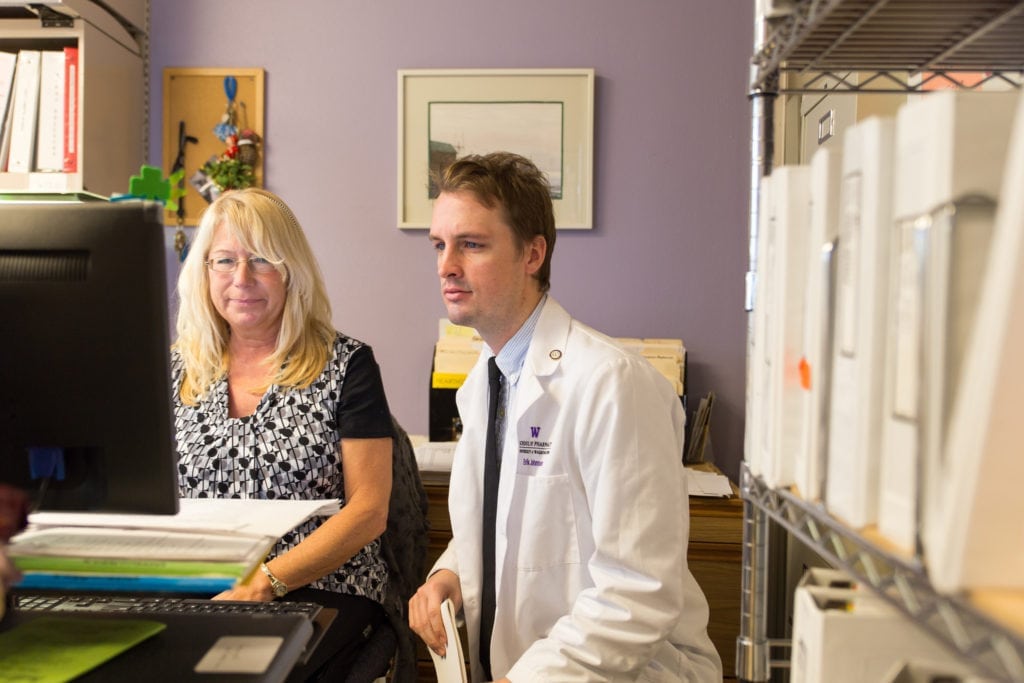
Clinical content from UW School of Pharmacy’s Drug Interaction Database to be integrated into Teva’s DDI+ platform to help improve health care delivery
The University of Washington (UW) announced today an exclusive partnership that will allow the university’s unique, comprehensive and high-quality pharmacokinetic and pharmacogenetic Drug Interaction Database (DIDB) clinical content to be integrated into the DDI+ platform. DDI+ is a cloud-based platform that complements electronic health records systems to help avoid adverse drug reactions. DDI+ was developed through Teva and is deployed by Mediseen, a wholly owned subsidiary of Teva.
Pharmaceutical companies and drug developers have been able to subscribe to the UW DIDB for many years. The DIDB is unique as it integrates highly detailed information regarding the experimental conditions and results of drug interaction, pharmacogenetic, and organ impairment studies from peer-reviewed journal articles and FDA New Drug Application Reviews.

Later in 2016, clinicians will have access to important pharmacokinetic, safety and efficacy information for their patients within DDI+. The platform’s extensive clinical content will pull from the DIDB and synchronize with data extracted from other leading databases, providing health care providers with information to help them detect, prioritize and solve adverse drug reactions quickly. Consideration can be given to multiple data points including the individual patient’s vital signs, preexisting health issues, available genetic markers and more against known drug-drug interactions and other drug precautions.
Adverse drug reactions exert a huge impact on patients’ health and on health costs and are among the top 10 causes of mortality in the US, more than car accidents, alcohol-induced fatalities and homicide. Each year, about 100,000 patients die and between 6 to 10% of hospitalizations are due to this phenomenon in the U.S. alone.

“Adverse drug reactions are preventable, but personalized prescription is complex and requires a strong understanding of the various physiological processes involved,” notes Pharmaceutics Clinical Professor and CoMotion Presidential Innovation Fellow, Isabelle Ragueneau-Majlessi, who directs the UW DIDB program. “We need to do a better job translating research findings into actionable clinical information for health care providers. It is critical to understand the potential magnitude and cascading effects of drug interactions.”
Bringing synthesized and current information to the point of care, along with a user-friendly and intuitive interface, positions the DDI+ system to help clinicians evolve patient-specific care. “The DDI+ platform provides real time, comprehensive, patient-specific and easy-to-understand information regarding drug-related problems and offers a simple, quick and efficient solution to a real need of physicians and pharmacists,” said Dr. Roni Shiloh, Head of the DDI+ program at Teva. “The DDI+ platform has the potential to improve medical decision-making with timely and accurate information.”
Bringing together a novel approach to deliver synthesized, accurate and up-to-date data points in an efficient and user-friendly system was a key consideration to both UW and Mediseen while exploring the exclusive partnership. “Innovation is our imperative,” states UW’s Vikram Jandhyala, Vice President for Innovation Strategy and Executive Director of CoMotion, the collaborative innovation hub. “We have been working with the DIDB Team since 2002 and see the new relationship as accelerating the impact of UW technology on healthcare. Hospitals and doctors need better tools for identifying and managing adverse drug interactions.”
View story in UW Health Sciences NewsBeat: Deal aims to extend value of UW’s drug-interaction database: Partnership shares School of Pharmacy’s large library of info with clinicians
###
About UWSOP, the DIDB, and UW CoMotion
The University of Washington School of Pharmacy (UWSOP) is a global leader in pharmacy education, research and service, committed to providing a transformative learning experience in a collaborative and diverse environment focused on improving the health and well-being of the communities we serve. UWSOP is comprised of three departments: Medicinal Chemistry, Pharmaceutics, and Pharmacy, offering Ph.D., M.S., and PharmD degrees, post docs and certificate programs. The Metabolism and Transport Drug Interaction Database™ (DIDB™) and the Pharmacogenetics Database (e-PKGene™) are part of a knowledge base (“DIDB Platform™“) designed for scientists and clinicians working in the field of drug development, drug disposition and drug-drug interactions (DDIs). The DIDB Platform was developed at the University of Washington’s Department of Pharmaceutics, School of Pharmacy with input from pre-clinical and clinical pharmaceutical scientists. The DIDB was first licensed in 2002 and is currently used by a large number of pharmaceutical companies, regulatory agencies, contract research organizations and academic institutions worldwide. For more information, visit www.druginteractioninfo.org. CoMotion at the UW is the collaborative innovation hub to expand the societal impact of the UW community by developing and connecting local and global innovation ecosystems. http://comotion.uw.edu
About Teva and DDI+
Teva Pharmaceutical Industries Ltd. (NYSE and TASE: TEVA) is a leading global pharmaceutical company that delivers high-quality, patient-centric healthcare solutions used by millions of patients every day. Headquartered in Israel, Teva is the world’s largest generic medicines producer, leveraging its portfolio of more than 1,000 molecules to produce a wide range of generic products in nearly every therapeutic area. In specialty medicines, Teva has a world-leading position in innovative treatments for disorders of the central nervous system, including pain, as well as a strong portfolio of respiratory products. Teva integrates its generics and specialty capabilities in its global research and development division to create new ways of addressing unmet patient needs by combining drug development capabilities with devices, services and technologies, such as DDI+. DDI+ was developed through a wholly owned subsidiary of Teva. For more information on Teva, visit www.tevapharm.com.